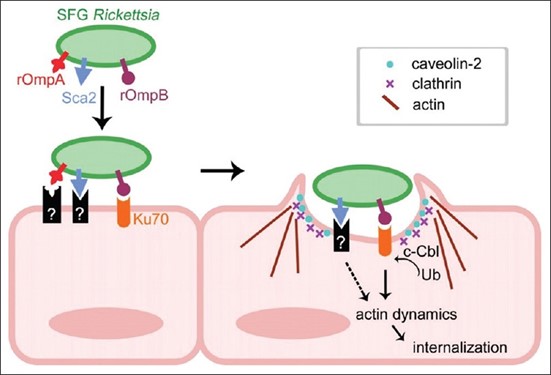Rickettsial infections are diseases associated with obligate intracellular organisms belonging to the order Rickettsiales. We offer a comprehensive package of services designed to further the development of vaccines and therapies for rickettsial infections.
Overview of Rickettsial Infection
Rickettsial diseases are caused by obligate intracellular bacteria belonging to the Rickettsia genus. Their transmission occurs through other organisms, such as infected ticks, fleas, lice, and mites. Rickettsial diseases have symptoms of acute febrile illnesses if untreated may have adverse results leading to multi-organ failure and even death. Depending on the species of rickettsia involved the symptoms show variations but primarily include fever, headache, rash and myalgia.
 Fig.1 Rickettsial proteins aiding in internalization and pathogenesis. (Kamath V., et al., 2020)
Fig.1 Rickettsial proteins aiding in internalization and pathogenesis. (Kamath V., et al., 2020)
Vaccine Development for Rickettsial Infection
Whole-Cell Antigen Vaccines
In the past, WCA vaccines were manufactured by inactivating or attenuating the bacteria which then evoked an all-encompassing immune response. Nonetheless, it has been observed that these techniques do face difficulties due to the loss of some structurally relevant antigenic determinants, modifying vaccine efficacy for the better or worse.
Subunit and Recombinant Protein Vaccines
Consider the advances in molecular biology that have propounded the analysis of immunodominant antigens, for instance, the surface cell antigens (Sca), which play a vital role in bacteria binding and invasion. Subunit type vaccines constructed against these proteins in particular appear to be safer when compared with WCA vaccines in preclinical models.
Nucleic Acid Vaccines
The introduction of nucleic acid vaccines which include both DNA and mRNA vaccines is a game-changing method in the development of vaccines since it contains a host-targeted mechanism allowing for the use of cellular biosystems to create particular antigens to achieve an immune response.
Vector-Based Vaccines
Another promising approach is the use of rickettsial antigens delivery systems based on viral or bacterial vectors. In particularly, adenoviral vectors have been shown to be able to mount strong humoral and cellular immunity against many pathogens and thus have potential relevance to rickettsial infections.
Therapeutics Development for Rickettsial Infection
Antibiotic Therapies
The cornerstone of rickettsial infection therapeutic remains antibiotics, in which case a good option is doxycycline. However, the need to develop new antimicrobial agents active against Rickettsiae is due to the parantongso of antibiotic resistance.
Host-Targeted Therapies
Modulating of host cell factors that are hijacked by Rickettsiae during infection is another area of drug research and development. Intervention in these pathways could limit bacterial multiplication and spread which represents an innovative type of therapeutics.
Our Services
Taking advantage of advanced technologies as well as extensive specifics of the rickettsial disease mechanism, we develop vaccines and therapeutics sufficing the rickettsial infection in a single package. Our pre-clinical research services enable a strong platform for assessment of safety, immunogenicity and efficacy of potential vaccines and drug candidates.
Disease Models
- C3H/HeN Mouse Models: Rickettsia typhi and Rickettsia conorii
- C57BL/6 Mouse Models: Rickettsia australis
- Balb/c Mouse Models: Rickettsia australis
- Endothelial Target Mouse Models
Preclinical Research
- Drug Safety Evaluation
- In Vivo Pharmacokinetics Study
- In Vitro Pharmacokinetics Study
- Activity Testing
- Drug Resistance Evaluation
Rickettsial infections can be treated with a novel scientific approach, but this will only be possible with a multicomponent approach to the bacteria's pathobiology. Vaccines and therapies are yet to be developed. The services we're offering are quite self-explanatory, we are planning on overcoming these kind of challenges in the medical field. So if you wish to engage in these kind of services, don't hesitate to reach us.
References
- Kamath Vasantha, et al. "Rickettsial infections: past and present perspectives." APIK Journal of Internal Medicine 8.1 (2020): 4-10.
- Osterloh Anke. "Vaccine design and vaccination strategies against rickettsiae." Vaccines 9.8 (2021): 896.
All of our services and products are intended for preclinical research use
only and cannot be used to diagnose, treat or manage patients.


 Fig.1 Rickettsial proteins aiding in internalization and pathogenesis. (Kamath V., et al., 2020)
Fig.1 Rickettsial proteins aiding in internalization and pathogenesis. (Kamath V., et al., 2020)



